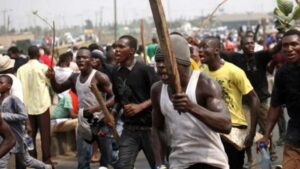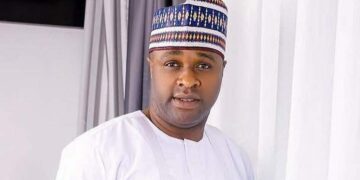
The unchecked excesses of Agbero—a growing faction of Area boys in Lagos—have persisted for far too long, becoming a significant socio-economic concern. Their constant harassment of commuters, illegal tax collection from transport operators, and disruption of public order undermine the civility expected in Nigeria’s foremost commercial hub. Beyond being a nuisance, Agbero adds to the already high cost of public transportation, further burdening residents.
The government must reject the notion that these groups are indispensable political allies, immune to the law. If Governor Babajide Sanwo-Olu truly aims to leave a legacy of a “Greater Lagos,” he cannot continue to turn a blind eye to the destructive activities of Agbero, which serve as a stark reminder of the city’s governance failures.
Lagos: A City of Contradictions
Lagos is not just Nigeria’s economic powerhouse; it is Africa’s most populous city and a rising global commercial hub. According to the World Economic Forum, Lagos ranks among the five fastest-growing cities in Africa, surpassing Kinshasa, Cairo, Luanda, and Nairobi. The World Bank further projects that by 2100, Lagos could become the world’s largest city, with an estimated population of 88 million—far beyond its current 21 million.
Despite its economic significance, Lagos remains one of the least livable cities globally. While expatriates find it relatively affordable, the Global Liveability Index 2024 ranked it as the fourth least livable city in the world. The Economist Intelligence Unit (EIU) placed Lagos 170th out of 173 cities, citing poor infrastructure, instability, inadequate healthcare, and environmental challenges. These issues are compounded by Agbero, whose unchecked dominance of the streets makes Lagos appear chaotic and ungovernable.
The Deep-Rooted Problem of Agbero
The rise of Agbero is neither new nor unique to Lagos. They are the product of decades of governmental neglect—failures in education, job creation, and youth empowerment. However, Lagos has become their stronghold, with thousands stationed at bus stops and motor parks, operating under the National Union of Road Transport Workers (NURTW). Their extortion has reached alarming levels, generating an estimated ₦120 billion annually—revenue that goes directly into private hands rather than public coffers.
A commercial driver, Yekeen Alao, shared his experience:
> “For every trip we take from the park, we must pay a fee equivalent to the fares of four passengers. If the fare per passenger is ₦700, we end up paying ₦2,800 to the park authorities.”
Beyond these official deductions, drivers must also pay Agbero at every stop where they pick up or drop off passengers. Those who resist face violent attacks, damage to their vehicles, and physical assault. To offset these losses, transport fares have skyrocketed by over 100%, making daily commutes even more expensive for residents.
Political Complicity and Governance Failure
The Lagos State government cannot continue to ignore this crisis. While Agbero may be politically significant during elections, no serious administration should tolerate their lawlessness for so long. Lagos, with its ambition to become a “smart city” of global relevance, cannot afford to let its transport sector be hijacked by state-backed and non-state actors engaging in open extortion.
Historically, efforts to curb the Area boys menace have failed. From the military era to civilian administrations, various interventions—including rehabilitation centers—have been attempted with little long-term success. Notably, during his tenure as Lagos Military Governor, Buba Marwa launched a rehabilitation program, branding Area boys as “Good Boys and Girls.” Later, Bola Tinubu, as Lagos Governor, introduced a more forceful approach, relocating defiant Area boys to Tekunle, a remote rehabilitation camp accessible only by boat.
Private and Community-Led Solutions
Beyond government efforts, private initiatives have also attempted to reform Area boys.
God Bless Nigeria Church gained recognition for rehabilitating young gang members, including the viral case of Shanowole, a boy who transformed after being rescued.
Chess in Slums Africa has successfully engaged Area boys in Oshodi and Ibadan, using chess to instill discipline and critical thinking.
Other organizations continue to work toward similar rehabilitation efforts.
Despite these interventions, the problem persists. However, the failure of past efforts does not absolve Governor Sanwo-Olu of responsibility. What new strategies has his administration introduced in nearly six years to address this long-standing issue? Governance is not about avoiding crises—it is about solving them.
The Path Forward: Reform Over Tolerance
The Lagos State government must take decisive action to reform Agbero and provide them with meaningful alternatives. Key steps should include:
1. Reviving and expanding rehabilitation programs to equip Agbero with vocational and life skills.
2. Strict enforcement of laws against extortion and violence in the transport sector.
3. Creating legal employment opportunities for those willing to transition out of the Agbero system.
4. Scaling up past initiatives such as Good Boys and Girls and Tough Love, with severe consequences for those who refuse to reform.
If Agbero is truly considered a “form of job creation,” then one must ask: How many children of government officials and politicians work as Agbero or wear NURTW uniforms? In which modern cities is extortion and hooliganism celebrated as an economic achievement?
Lagos deserves better. If the state government is serious about its Greater Lagos vision, it must prioritize the reformation of Agbero—not their empowerment.



















